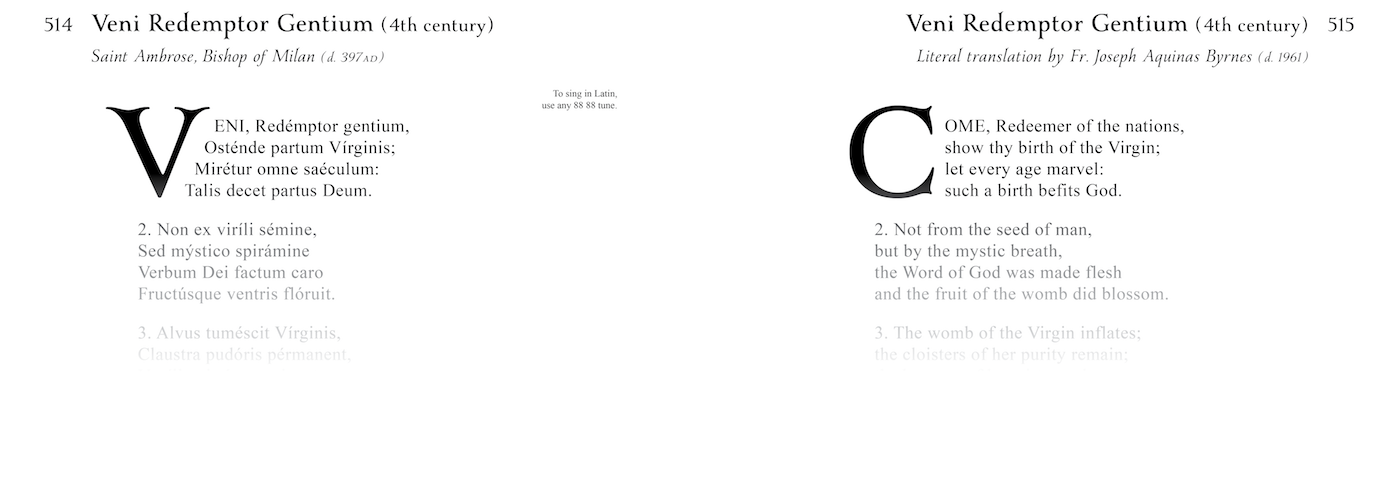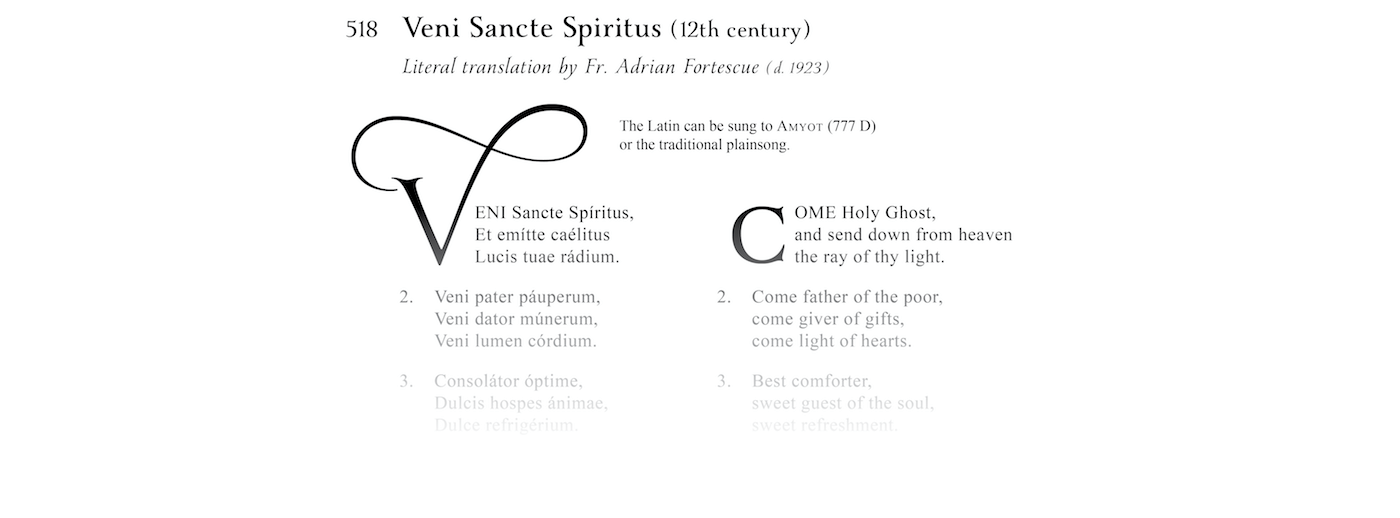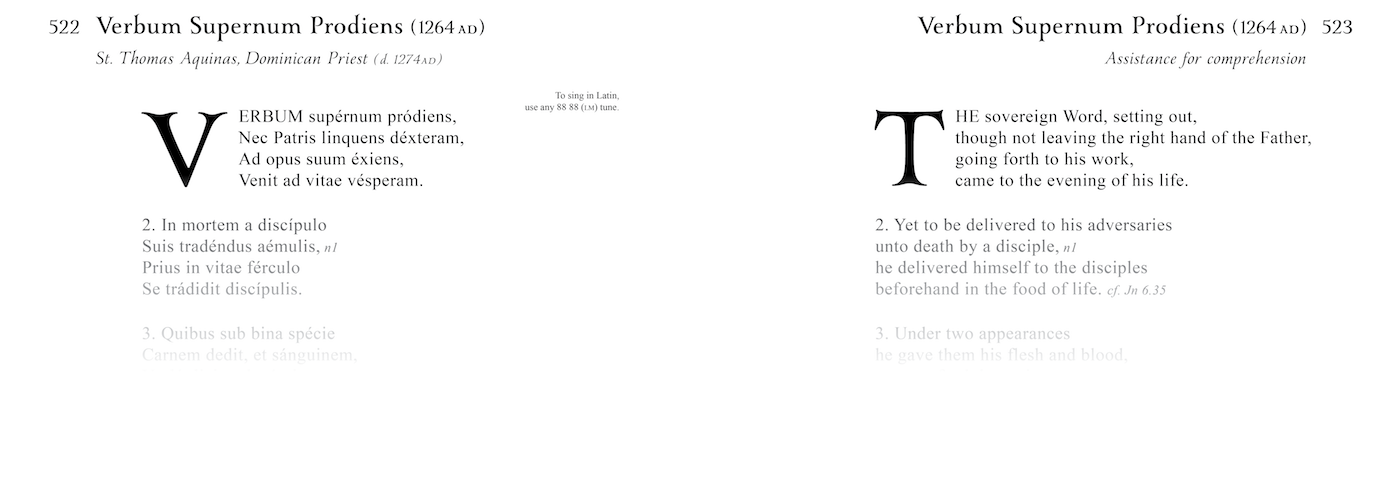Brebeuf Hymn Index
Sancti Venite, Christi Corpus Sumite
(“Come all ye holy”)
Translation: Fr. Adrian Fortescue
EIGHTH TUNE: “Heart of Sorrow 5B” • 57 57
Sancti Venite, Christi Corpus Sumite
Translation: Textus originalis Latinus
EIGHTH TUNE: “Heart of Sorrow 5B” • 57 57
Sancti Venite, Christi Corpus Sumite
(“Come all ye holy”)
Translation: Fr. Adrian Fortescue
NINTH TUNE: “Würtemburg 5B” • 57 57 A
Sancti Venite, Christi Corpus Sumite
Translation: Textus originalis Latinus
NINTH TUNE: “Würtemburg 5B” • 57 57 A
Sancti Venite, Christi Corpus Sumite
(“Come all ye holy”)
Translation: Fr. Adrian Fortescue
TENTH TUNE: “Christ Ist Erstanden” • 57 57
Sancti Venite, Christi Corpus Sumite
Translation: Textus originalis Latinus
TENTH TUNE: “Christ Ist Erstanden” • 57 57
Sancti Venite, Christi Corpus Sumite
(“Approach, ye just, and take”)
Translation: Msgr. Hugh T. Henry
FIRST TUNE: “Seán” • 66 66 Iambic
Sancti Venite, Christi Corpus Sumite
(“Approach, ye just, and take”)
Translation: Msgr. Hugh T. Henry
SECOND TUNE: “Camcolt” • 66 66 Iambic
Sancti Venite, Christi Corpus Sumite
(“Approach, ye just, and take”)
Translation: Msgr. Hugh T. Henry
THIRD TUNE: “Clermont” • 66 66 Iambic
Sancti Venite, Christi Corpus Sumite
(“Approach, ye just, and take”)
Translation: Msgr. Hugh T. Henry
Text only—can be used with any 66 66 Iambic
Sancti Venite, Christi Corpus Sumite
(“Draw nigh and take the Body of the Lord”)
Translation: Fr. Herbert Thurston (d. 1939) after Neale
FIRST TUNE: “All Souls” • 10 10 10 10
Sancti Venite, Christi Corpus Sumite
(“Draw nigh and take the Body of the Lord”)
Translation: Fr. Herbert Thurston (d. 1939) after Neale
SECOND TUNE: “Anima Christi 10a” • 10 10 10 10
Sancti Venite, Christi Corpus Sumite
(“Draw nigh and take the Body of the Lord”)
Translation: Fr. Herbert Thurston (d. 1939) after Neale
THIRD TUNE: “Eventide” • 10 10 10 10
Sancti Venite, Christi Corpus Sumite
(“Draw nigh and take the Body of the Lord”)
Translation: Fr. Herbert Thurston (d. 1939) after Neale
FOURTH TUNE: “Song 24” • 10 10 10 10
Sancti Venite, Christi Corpus Sumite
(“Draw nigh and take the Body of the Lord”)
Translation: Fr. Herbert Thurston (d. 1939) after Neale
FIFTH TUNE: “Toulon” • 10 10 10 10
Sancti Venite, Christi Corpus Sumite
(“Draw nigh and take the Body of the Lord”)
Translation: Fr. Herbert Thurston (d. 1939) after Neale
SIXTH TUNE: “Farley Castle” • 10 10 10 10
Stabat Mater Dolorosa
13th century
In addition to providing the Latin version with accent marks, the Saint Jean de Brébeuf Hymnal commissioned English translations from Latin scholars to help congregations appreciate these ancient prayers. Until the Brébeuf Hymnal appeared in 2018, literal translations for many of these hymns had never been made.
Stabat Mater Dolorosa
(“At the Cross her station keeping”)
by Cento Translation
“Stabat Mater” • 887
Translation is a CENTO by Fr. Edward Caswall (d. 1878); Very Rev’d Dominic Aylward (d. 1872); Denis Florence MacCarthy (d. 1882); Athanasius Diedrich Wackerbarth (d. 1884); Aubrey Thomas de Vere (d. 1902); Fr. John Fitzpatrick (d. 1929); Hon. Daniel Joseph Donahoe (d. 1930); Msgr. Hugh T. Henry (d. 1946); and Msgr. Ronald A. Knox (d. 1957).
Stabat Mater Dolorosa
(“At the Cross her station keeping”)
by Cento Translation
“Stabat Mater” • 887
Translation is a CENTO by Fr. Edward Caswall (d. 1878); Very Rev’d Dominic Aylward (d. 1872); Denis Florence MacCarthy (d. 1882); Athanasius Diedrich Wackerbarth (d. 1884); Aubrey Thomas de Vere (d. 1902); Fr. John Fitzpatrick (d. 1929); Hon. Daniel Joseph Donahoe (d. 1930); Msgr. Hugh T. Henry (d. 1946); and Msgr. Ronald A. Knox (d. 1957).
Stabat Mater Dolorosa
(“Under the World-redeeming Rood”)
Translation: Historic Roman Catholic Translation • 1687AD
“Bayeux” • 887
Since this is a “historic” translation, conscientious choirmasters should make sure their individual circumstances warrant its selection.
Stabat Mater Dolorosa
(“The Mother stood in woeful wise”)
Translation: Historic Roman Catholic Translation • 1599AD
TUNE: “Stabat Mater” • 887
In the 1599AD Preface, Richard Verstegan says: “Notwithstanding the difficulty, these hymns have been so turned into English meter that they may be sung unto the same tunes in English that they bear in Latin.” For this particular translation, the harmonic rhythm must be that of Solesmes Abbey, generally known as the “Classical Solesmes Method.” See the following: (1) Daily Hymn Book (Westminster, 1949) p. 64, by Henri Potiron (d. 1972), Maître de Chapelle de la Basilique du Sacré Coeur et Professeur a l’Institut Grégorien; (2) Liber Cantualis Comitante Organo (Solesmes, 1981) p. 37, by Abbé Ferdinand Portier; (3) Accompaniment to the Music of Holy Week (Gregorian Institute of America, 1957) p. 83, by Dr. Eugene Lapierre, organist at Saint-Alphonse-d’Youville in Montréal.
Urbs Jerusalem Beata
6th century
Title after 1631AD: “Caelestis Urbs Jerusalem”
In addition to providing the Latin version with accent marks, the Saint Jean de Brébeuf Hymnal commissioned English translations from Latin scholars to help congregations appreciate these ancient prayers. Until the Brébeuf Hymnal appeared in 2018, literal translations for many of these hymns had never been made.
Urbs Jerusalem Beata
(“City Celestial, Salem blest”)
Translation: Fr. John Wilfrid Wallace, OSB
FIRST TUNE: “St Catherine” • 88 88 88
Urbs Jerusalem Beata
(“City Celestial, Salem blest”)
Translation: Fr. John Wilfrid Wallace, OSB
SECOND TUNE: “St Philip” • 88 88 88
Urbs Jerusalem Beata
(“Celestial City, Salem blest”)
Translation: Fr. John Wilfrid Wallace, OSB
THIRD TUNE: “Vater Unser” • 88 88 88
Urbs Jerusalem Beata
(“City Celestial, Salem blest”)
Translation: Fr. John Wilfrid Wallace, OSB
FOURTH TUNE: “Angels’ Song 8e” • 88 88 88
Urbs Jerusalem Beata
(“Celestial City, Salem blest”)
Translation: Fr. John Wilfrid Wallace, OSB
FIFTH TUNE: “Stella” • 88 88 88
Urbs Jerusalem Beata
(“Celestial City, Salem blest”)
Translation: Fr. John Wilfrid Wallace, OSB
Text only—can be used with any 88 88 88
Urbs Jerusalem Beata
(“Jerusalem o city blest”)
Translation: Historic Roman Catholic Translation • 1599AD
Alongside the Latin—with textual accents—is printed a Roman Catholic (rhyming) translation of great historical interest. The version printed in the Brébeuf Hymnal is quite rare, and we were not able to obtain permission to post excerpts online.
Caelestis Urbs Jerusalem
(“Jerusalem, whose Name contains”)
Translation: Historic Roman Catholic Translation • 1719AD
Alongside the Latin—with textual accents—is printed a Roman Catholic (rhyming) translation of great historical interest. The version printed in the Brébeuf Hymnal is quite rare, and we were not able to obtain permission to post excerpts online.
Veni Creator Spiritus
9th century
In addition to providing the Latin version with accent marks, the Saint Jean de Brébeuf Hymnal commissioned English translations from Latin scholars to help congregations appreciate these ancient prayers. Until the Brébeuf Hymnal appeared in 2018, literal translations for many of these hymns had never been made.
Veni Creator Spiritus
(“Come, O Creator-Spirit, deign”)
Translation: Fr. John Fitzpatrick, Oblate of Mary
TUNE: “Cupertino” • 88 88 (LM)
Veni Creator Spiritus
(“Come, O Creator-Spirit, deign”)
Translation: Fr. John Fitzpatrick, Oblate of Mary
Text only—can be used with any 88 88 (LM)
Veni Creator Spiritus
(“Creator-Spirit, Lord of grace”)
Translation: Robert Campbell of Skerrington
FIRST TUNE: “Gonfalon Royal” • 88 88 (LM)
Veni Creator Spiritus
(“Creator-Spirit, Lord of grace”)
Translation: Robert Campbell of Skerrington
SECOND TUNE: “Ioannes” • 88 88 (LM)
Veni Creator Spiritus
(“Creator-Spirit, Lord of grace”)
Translation: Robert Campbell of Skerrington
THIRD TUNE: “Erschienen Ist” • 88 88 (LM)
Veni Creator Spiritus
(“Creator-Spirit, Lord of grace”)
Translation: Robert Campbell of Skerrington
FOURTH TUNE: “Eisenach” • 88 88 (LM)
Veni Creator Spiritus
(“Creator-Spirit, Lord of grace”)
Translation: Robert Campbell of Skerrington
FIFTH TUNE: “Rogers Park” • 88 88 (LM)
Veni Creator Spiritus
(“Creator-Spirit, Lord of grace”)
Translation: Robert Campbell of Skerrington
SIXTH TUNE: “Whitehall” • 88 88 (LM)
Veni Creator Spiritus
(“Creator-Spirit, Lord of grace”)
Translation: Robert Campbell of Skerrington
SEVENTH TUNE: “Woolmer’s” • 88 88 (LM)
Veni Creator Spiritus
(“Creator-Spirit, Lord of grace”)
Translation: Robert Campbell of Skerrington
Text only—can be used with any 88 88 (LM)
Veni Creator Spiritus
(“Come, Holy Ghost, Creator blest”)
Translation: Fr. Edward Caswall, Oratorian
TUNE: “Lambillotte” • 88 88 (LM)
Textual sources are “New Saint Basil Hymnal” (1958) p. 135 and “Mediator Dei Hymnal” (1955) p. 39; the original text by Fr. Caswall has been altered and shortened in this traditional version.
Veni Creator Spiritus
(“Come, O Creator Spirit blest”)
Translation: Fr. Edward Caswall, Oratorian
Text only—can be used with any 88 88 (LM)
Veni Creator Spiritus
(“Come holy Ghost that us hath made”)
Translation: Historic Roman Catholic Translation • 1599AD
Alongside the Latin—with textual accents—is printed a Roman Catholic (rhyming) translation of great historical interest. The version printed in the Brébeuf Hymnal is quite rare, and we were not able to obtain permission to post excerpts online.
Veni Creator Spiritus
(“Come Creator, Spir’t divine”)
Translation: Historic Roman Catholic Translation • 1651AD
Alongside the Latin—with textual accents—is printed a Roman Catholic (rhyming) translation of great historical interest. The version printed in the Brébeuf Hymnal is quite rare, and we were not able to obtain permission to post excerpts online.
Veni Redemptor Gentium
4th century
In addition to providing the Latin version with accent marks, the Saint Jean de Brébeuf Hymnal commissioned English translations from Latin scholars to help congregations appreciate these ancient prayers. Until the Brébeuf Hymnal appeared in 2018, literal translations for many of these hymns had never been made.
Veni Redemptor Gentium
(“Savior of the nations, come”)
Translation: William Morton Reynolds
TUNE: “Nun Komm Der Heiden Heiland” • 77 77
Veni Redemptor Gentium
(“Come, Thou Redeemer of the earth”)
Translation: Dr. John M. Neale
TUNE: “O Heiland Reiss” • 88 88 (LM)
Veni Sancte Spiritus
12th century
This literal translation was created by Fr. Adrian Fortescue.
In addition to providing the Latin version with accent marks, the Saint Jean de Brébeuf Hymnal commissioned English translations from Latin scholars to help congregations appreciate these ancient prayers. Until the Brébeuf Hymnal appeared in 2018, literal translations for many of these hymns had never been made.
Veni Sancte Spiritus
(“Holy Spirit, Lord of light”)
Translation: Fr. Edward Caswall, Oratorian
TUNE: “Amyot” • 777 D
Veni Sancte Spiritus
(“Holy Spirit, Lord of light”)
Translation: Fr. Edward Caswall, Oratorian
TUNE: “Champlain” • 777 with Refrain
Veni Sancte Spiritus
(“Come into us, Holy Ghost”)
Translation: Historic Roman Catholic Translation • 1651AD
Alongside the Latin—with textual accents—is printed a Roman Catholic (rhyming) translation of great historical interest. The version printed in the Brébeuf Hymnal is quite rare, and we were not able to obtain permission to post excerpts online.
Verbum Supernum Prodiens
1264AD
In addition to providing the Latin version with accent marks, the Saint Jean de Brébeuf Hymnal commissioned English translations from Latin scholars to help congregations appreciate these ancient prayers. Until the Brébeuf Hymnal appeared in 2018, literal translations for many of these hymns had never been made.
The final two verses are “O SALUTARIS HOSTIA.”
Verbum Supernum Prodiens
(“The Word proceeding from above”)
Translation: Fr. Dylan Schrader
TUNE: “Duguet” • 88 88 (LM)
Verbum Supernum Prodiens
(“The Word proceeding from above”)
Translation: Fr. Dylan Schrader
INCLUDES THE O SALUTARIS HOSTIA
Text only—can be used with any 88 88 (LM)
Vexilla Regis Prodeunt
6th century
In addition to providing the Latin version with accent marks, the Saint Jean de Brébeuf Hymnal commissioned English translations from Latin scholars to help congregations appreciate these ancient prayers. Until the Brébeuf Hymnal appeared in 2018, literal translations for many of these hymns had never been made.
Vexilla Regis Prodeunt
(“The King’s bright banner gleams above”)
Translation: Fr. Frederick C. Husenbeth
FIRST TUNE: “Gonfalon Royal” • 88 88 (LM)
Vexilla Regis Prodeunt
(“The King’s bright banner gleams above”)
Translation: Fr. Frederick C. Husenbeth
SECOND TUNE: “Notre Dame” • 88 88 (LM)
Vexilla Regis Prodeunt
(“The King’s bright banner gleams above”)
Translation: Fr. Frederick C. Husenbeth
THIRD TUNE: “Trinity College” • 88 88 (LM)
Vexilla Regis Prodeunt
(“The King’s bright banner gleams above”)
Translation: Fr. Frederick C. Husenbeth
FOURTH TUNE: “Ioannes” • 88 88 (LM)
Vexilla Regis Prodeunt
(“The King’s bright banner gleams above”)
Translation: Fr. Frederick C. Husenbeth
FIFTH TUNE: “Woolmer’s” • 88 88 (LM)
Vexilla Regis Prodeunt
(“The King’s bright banner gleams above”)
Translation: Fr. Frederick C. Husenbeth
SIXTH TUNE: “Wareham” • 88 88 (LM)
Vexilla Regis Prodeunt
(“The King’s bright banner gleams above”)
Translation: Fr. Frederick C. Husenbeth
SEVENTH TUNE: “Das Walt’ Gott Vater” • 88 88 (LM)
Vexilla Regis Prodeunt
(“The King’s bright banner gleams above”)
Translation: Fr. Frederick C. Husenbeth
Text only—can be used with any 88 88 (LM)
Vexilla Regis Prodeunt
(“The King of kings his banner rears”)
Translation: Robert Campbell of Skerrington
TUNE: “Agincourt” • 88 88 (LM)
Vexilla Regis Prodeunt
(“The King of kings his banner rears”)
Translation: Robert Campbell of Skerrington
Text only—can be used with any 88 88 (LM)
Vexilla Regis Prodeunt
(“The King’s bright banners forward go”)
Translation: Edward Arthur Dayman
FIRST TUNE: “Rogers Park” • 88 88 (LM)
Vexilla Regis Prodeunt
(“The King’s bright banners forward go”)
Translation: Edward Arthur Dayman
SECOND TUNE: “Duguet” • 88 88 (LM)
Vexilla Regis Prodeunt
(“The King’s bright banners forward go”)
Translation: Edward Arthur Dayman
THIRD TUNE: “Whitehall” • 88 88 (LM)
Vexilla Regis Prodeunt
(“The King’s bright banners forward go”)
Translation: Edward Arthur Dayman
FOURTH TUNE: “Eisenach” • 88 88 (LM)
Vexilla Regis Prodeunt
(“The King’s bright banners forward go”)
Translation: Edward Arthur Dayman
FIFTH TUNE: “Melcombe” • 88 88 (LM)
Vexilla Regis Prodeunt
(“The King’s bright banners forward go”)
Translation: Edward Arthur Dayman
SIXTH TUNE: “Kempen” • 88 88 (LM)
Vexilla Regis Prodeunt
(“The King’s bright banners forward go”)
Translation: Edward Arthur Dayman
SEVENTH TUNE: “Bressani” • 88 88 (LM)
Vexilla Regis Prodeunt
(“The King’s bright banners forward go”)
Translation: Edward Arthur Dayman
EIGHTH TUNE: “Winchester New” • 88 88 (LM)
Vexilla Regis Prodeunt
(“The King’s bright banners forward go”)
Translation: Edward Arthur Dayman
NINTH TUNE: “Altona” • 88 88 (LM)
Vexilla Regis Prodeunt
(“The King’s bright banners forward go”)
Translation: Edward Arthur Dayman
Text only—can be used with any 88 88 (LM)
Vexilla Regis Prodeunt
(“The banners of the King come forth”)
Translation: Historic Roman Catholic Translation • 1599AD
Alongside the Latin—with textual accents—is printed a Roman Catholic (rhyming) translation of great historical interest. The version printed in the Brébeuf Hymnal is quite rare, and we were not able to obtain permission to post excerpts online.
Vexilla Regis Prodeunt
(“Abroad the Regal Banners fly”)
Translation: Historic Roman Catholic Translation • 1651AD
Alongside the Latin—with textual accents—is printed a Roman Catholic (rhyming) translation of great historical interest. The version printed in the Brébeuf Hymnal is quite rare, and we were not able to obtain permission to post excerpts online.
- Live Recording A •
- Score in Latin
Victis Sibi Cognomina
In addition to providing the Latin version with accent marks, the Saint Jean de Brébeuf Hymnal commissioned English translations from Latin scholars to help congregations appreciate these ancient prayers. Until the Brébeuf Hymnal appeared in 2018, literal translations for many of these hymns had never been made.
Victis Sibi Cognomina
(“From conquered realms let tyrants claim”)
Translation: John David Chambers
FIRST TUNE: “Gonfalon Royal” • 88 88 (LM)
Victis Sibi Cognomina
(“From conquered realms let tyrants claim”)
Translation: John David Chambers
SECOND TUNE: “Notre Dame” • 88 88 (LM)
Victis Sibi Cognomina
(“From conquered realms let tyrants claim”)
Translation: John David Chambers
THIRD TUNE: “Altona” • 88 88 (LM)
Victis Sibi Cognomina
(“From conquered realms let tyrants claim”)
Translation: John David Chambers
FOURTH TUNE: “Ioannes” • 88 88 (LM)
Victis Sibi Cognomina
(“From conquered realms let tyrants claim”)
Translation: John David Chambers
FIFTH TUNE: “Winchester New” • 88 88 (LM)
Victis Sibi Cognomina
(“From conquered realms let tyrants claim”)
Translation: John David Chambers
Text only—can be used with any 88 88 (LM)
Victis Sibi Cognomina
(“Conquering kings their titles take”)
Translation: John Chandler
FIRST TUNE: “Paschal Lamb” • 77 77 D
Victis Sibi Cognomina
(“Conquering kings their titles take”)
Translation: John Chandler
SECOND TUNE: “St George” • 77 77 D
Victis Sibi Cognomina
(“Conquering kings their titles take”)
Translation: John Chandler
THIRD TUNE: “Salzburg” • 77 77 D
Victis Sibi Cognomina
(“Conquering kings their titles take”)
Translation: John Chandler
FOURTH TUNE: “Orientis Partibus” • 77 77
Victis Sibi Cognomina
(“Conquering kings their titles take”)
Translation: John Chandler
FIFTH TUNE: “Gott Sei Dank” • 77 77 A
Victis Sibi Cognomina
(“Conquering kings their titles take”)
Translation: John Chandler
SIXTH TUNE: “Heustis” • 77 77 D
Victis Sibi Cognomina
(“Conquering kings their titles take”)
Translation: John Chandler
SEVENTH TUNE: “Song 13” • 77 77
Victis Sibi Cognomina
(“Conquering kings their titles take”)
Translation: John Chandler
Text only—can be used with any 77 77
Veni Veni Emmanuel (The “O” Antiphons)
Old Testament titles for the Messiah
Veni Veni Emmanuel
(“O come, O come, Emmanuel”)
Translation: Msgr. Ronald A. Knox
TUNE: “Veni Veni Emmanuel” • 88 88 R
Jordanis Oras Praevia
(“On Jordan’s bank the Baptist’s cry”)
Translation: Fr. Charles Coffin
TUNE: “Winchester New” • 88 88 (LM)
En Clara Vox Redarguit
(“Hark! a voice, in urgent warning”)
Translation: Fr. John Fitzpatrick, Oblate of Mary
TUNE: “Merton” • 87 87
Instantis Adventum Dei
(“The coming of our God”)
Translation: Fr. Charles Coffin
TUNE: “Seán 8M” • 66 86 (SM)
A “text only version” is included at page bottom, providing melodic flexibility.
Venez Divin Messie
(“O come, Divine Messiah”)
Translation: Sister Mary of Saint Philip
TUNE: “Venez, Divin Messie” • 78 76 R
“Lo! He Comes With Clouds Descending”
by John Cennick
TUNE: “Helmsley” • 87 87 47




























































































